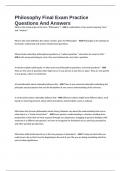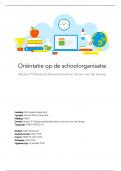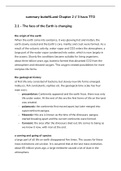Philosophy Final Exam Practice
Questions And Answers
What is the Greek origin of the term "Philosophy"? - ANS A combination of two words meaning "love"
and "wisdom."
What is the main definition the author, Kessler, gives for Philosophy? - ANS Philosophy is the attempt to
formulate, understand and answer fundamental questions.
When Kessler describes philosophical questions as "radical questions," what does he mean by this? -
ANS In the sense pertaining to roots, they are fundamental, very basic, questions.
As Kessler explains philosophy, in what sense are philosophical questions, universal questions? - ANS
They are the sorts of questions that might occur to any person at any time or place. They are not specific
to any group, culture or profession.
A foundationalist about rationality believes that - ANS There is one universal rationality embodying the
principles and procedures that are the foundation of any correct understanding of the universe.
A constructivist about rationality believes that - ANS Different cultures might have different ideas, each
based on shared agreement, about which procedures and principles count as rational.
What does the German philosopher Hands-Georg Gadamer say about the understanding that occurs
when there is a "fusion of horizons?" - ANS Every person's understanding is a horizon resulting from
perspective or bias that we have acquired through our experiences. Engaging in genuine dialogue with
someone of a different perspective, we learn to recognize the limitations of our previous perspective
and other possible perspectives.
What does Jiddu Krishnamurti say is the true purpose of education? - ANS To help you find what you
really love to do so that from the beginning to the end of your life you are doing something which for
you has deep significance.
,Where for Russell is the value of philosophy to be found? - ANS The value is seen indirectly, in the
effects it has on the lives of those who study philosophy, in helping them become more imaginative,
more open minded and less self absorbed.
Why does Russell maintain that the "uncertainty of philosophy is more apparent than the real?" - ANS
The questions that have become defined enough to answer are placed in the sciences, and those left
over without definite answers remain as the "residue which is called philosophy."
What does Russell mean when he asserts that the value of philosophy is to be sought in its "very
uncertainty." How can uncertainty be a valuable thing? - ANS The uncertainty of philosophy can free our
thoughts from the tyranny of custom and dogmatism. It can bring a sense of calm freedom to at least
consider the possibility that the conventional assumptions we have been taught may be untrue.
According to Russell what may be the chief value of philosophy? - ANS The chief value of philosophy lies
in the greatness of the objects which it contemplates, and the freedom from narrow and personal aims
resulting from this contemplation.
What is the main point Socrates made by telling the story of the Oracle of Delphi? - ANS He explains that
his activities were in response to a report that the Oracle declared that he, Socrates, was the wisest man
in Athens and, in an attempt to refute that claim, he made many enemies who now bring false charges
against him.
How does Socrates defend himself against the charge of corrupting the youth? - ANS That it is very
unlikely that he, among all the Athenians, is the only one who might be guilty of this offense and if he
did it, he must have done it unintentionally and should have been admonished rather than prosecuted.
How does Socrates defend himself against the charge of Atheism? - ANS He argues that the charge is
contradictory. Meletus admits Socrates believes in divine activities, but charges him with atheism
(believing in no divine activities at all).
,Why does Socrates think fearing death is unwise? - ANS We do not know what death is , so it is not
rational to fear what might very well be like nothing, or perhaps even a great good, like an afterlife
inhabited by interesting virtuous people in which he could continue his philosophical investigations.
At one point Socrates compares himself to a gadfly (horsefly) and the Athenians to a thoroughbred
horse. What is the point of this comparasion? - ANS The Athenians are intellectually lazy and need a
philosopher like Socrates to stimulate them to thought, like a horsefly's bite might stimulate a lazy horse
into action. His philosophical activities are helpful in stimulating thought, even though they initially feel
painful.
What does West identify as the "Three Pillars of Democracy," or three traditions needed to revitalize
and regenerate a democratic society like ours? - ANS (1) The tradition of Socratic Questioning; free and
fearless speech, asking questions. (2) The Jewish tradition of Prophetic Witness; care and compassion for
those who are unjustly treated. (3) The African American tradition of a Blues Sensibility; persevering
towards justice, even when success seems unlikely or distant.
West argues that the examined life that Socrates recommends is painful, and involves "wrestling with
forms of death". He argues that getting an education involves "learning how to die". What does he mean
by this? - ANS Becoming a better person means letting your current self "die;" letting go of values and
practices that might be "core" to your identity, but which do not seem defensible after critical
examination.
What does West identify as "American Terrorism?" - ANS Slavery, Jim Crow, lynchings. People being
hated and subjugated to violence because of who they are.
What does West think we as a society can learn from "American Terrorism?" How does this response
illustrate the third pillar of democracy? - ANS The response by the African American Blues tradition of
persevering in the face of inhumanity and injustice, even when the odds of success are vanishingly small
and very far off into the future.
What does West mean by "tragic comic hope?" How is it relevant to revitalizing and restoring
democracy? - ANS Recognizing how deeply problematic things are, especially for those who aren't
ourselves, but having hope we can make these things better if we work hard, even in the face of
seemingly insurmountable odds. It is the only way we can make progress as a democratic society.
, The brain is like a computer. Its structure is the hardware and socialization is the software. Sensations
are the input that it processes. Thus, just as the output of a computer is predictable once we know the
software, hardware, and input, so the actions of the human being are predictable.
This argument is: - ANS Both an analogy and inductive.
If reforming the medical care system works, then the president has shown good judgment. Reforming
the medical care system has worked, therefore the president has shown good judgment.
This argument is: - ANS Modus Ponens
If being loved by God is a sufficient condition of goodness, then something that is not loved by God
might still be good. - ANS True
Imagine that you want to use the disjunctive syllogism form of argument to construct an argument to
show that "Mencius believes that Human nature is good" is true.
Which of the following would be the premises in a valid disjunctive syllogism with this as the
conclusion?. - ANS Either Mencius believes human nature is good or he believes it is evil.
It is not true that Mencius believes human nature is evil.
Taylor describes the myth of Sisyphus as a picture of a perfectly meaningless existence.
He imagines a "perverse" yet also "merciful" alteration to the story however, that perhaps makes
Sisyphus' life a meaningful one. What is that alteration? - ANS The gods give him a compulsion to roll the
stone up the hill. It is what he deeply wants to do.
Taylor describes caves in New Zealand in which glow worms create seemingly beautiful constellations of
light on the walls of subterranean caves. What is the moral Taylor draws from this example, about the
point of any living thing's life? - ANS The purpose of life of every living thing is to only perpetuate life
itself, to keep the same meaningless cycles of toil continuing for generations.






